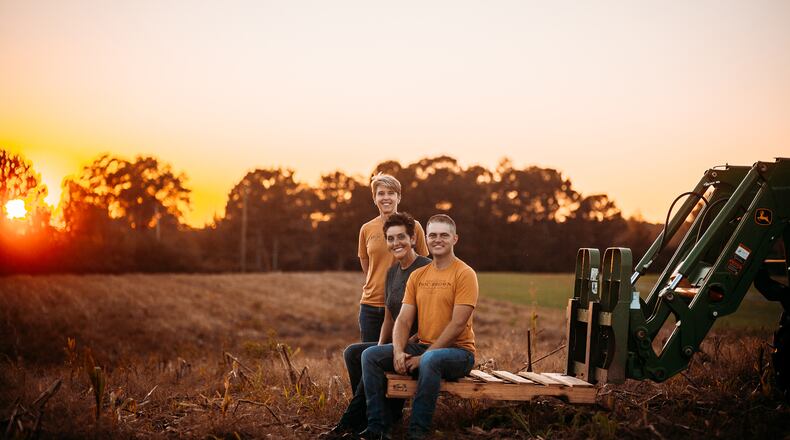Amy Brown calls herself a bourbon farmer. For that to make sense, you only need to learn how Doc Brown’s Farm & Distillers came to produce a line of bourbon creams that local liquor stores can’t seem to keep on their shelves.
Born and raised in Buford, Brown bought a farm in Senoia in 2018 with her partner in life and business, Paige Dockweiler — the “Doc” in the company name. While Dockweiler grew up on a farm in Cordele that grew corn and soybeans, she, like Brown, never thought farming was her future. Both had been in the professional world for 30 years — Brown in banking, and Dockweiler in oncology nursing and hematology.
During a beach trip, Brown’s son, Daniel Williams, who is her other business partner, passed around an article about Jimmy Red corn and Charleston’s High Wire Distilling. They all agreed it would be a fine idea to grow the rare heirloom corn, helping preserve not just the heritage of the Native Americans who first farmed it, but also of the bootleggers who made moonshine from the deep-red kernels.
Brown got in touch with Andy Sudderth, master distiller and CEO of R.M. Rose Distillery in Dillard. After a year of growing and milling, Doc Brown’s delivered milled heirloom corn to Sudderth to distill. His response: “I think you’re onto something — how much can you grow?”
After extensive research, Brown discovered that there are not many people who grow corn, distill it and bottle whiskey. “Hardly any do it all in the same state,” she said. A business plan was born.
Credit: Amy Brown
Credit: Amy Brown
“And, here we are, going into our fourth year making whiskey, and having an absolute blast,” Brown said.
There are 13 barrels of Jimmy Red bourbon aging for release after May 2023, the four-year mark. New oak barrels are sourced from Gainesville Cooperage, the only cooperage in Georgia. While Doc Brown’s bourbon is aging, the company also makes bourbon creams. Each flavor — butter pecan, coffee and peppermint mocha — is made with bourbon that has been aged for two years.
Brown and Dockweiler grow the non-genetically modified organism corn on their 20-acre farm, as well as 100 acres they lease, using only organic methods. There are numerous bat houses around the property, for both pollination and fighting corn earworms. They also brought in beehives, and a beekeeper to manage them.
“Even though corn is wind-pollinated, we brought in bees to help with it,” Brown said. After doing that, their second crop yield increased by 30%, both in the size of the ears and the number of kernels. In addition to buying bees, they also planted pollinator shrubs, to attract bees and bats.
Once the corn matures from yellow to deep red, it is harvested and ground to a consistency somewhere between cornmeal and grits, to carry the rich, sweet flavor to the whiskey.
Credit: Amy Brown
Credit: Amy Brown
The corn is trucked to Dillard, to be distilled in a handmade copper still. R.M. Rose Distillery has “good water,” Brown said, adding that Sudderth “dug a deep well,” and the limestone-filtered water is from the foothills of the Blue Ridge Mountains, and doesn’t need any treatment.
“That matters,” she said. “It’s the secret ingredient in Kentucky bourbon, the same limestone ridge.”
But, without good grains, Brown said, “you are not going to get a quality bourbon.” Their bourbon’s mash bill is a secret, but it has a high mix of corn, as well as locally grown rye.
Their butter pecan bourbon cream, made with pecans grown by a local farmer, pays homage to Dockweiler’s family, who also grew the nuts, a Georgia favorite.
While you wait on Doc Brown’s straight bourbon, the three varieties of bourbon cream (39-proof, 750-milliliter bottles for $34.99) are available at retailers in Georgia. Find out more at docbrownfarm.com.
Sign up for the AJC Food and Dining Newsletter
Read more stories like this by liking Atlanta Restaurant Scene on Facebook, following @ATLDiningNews on Twitter and @ajcdining on Instagram.
About the Author
The Latest
Featured



